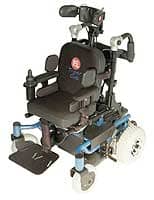Propelling a wheelchair can create substantial wear and tear on the upper limbs, and rotator cuff tendon damage caused by years of use can make shoulder pain a fact of life for many wheelchair users. Surgery may sometimes be the only option to address pain symptoms, but a simple injection of fat may offer a better solution.
A team of specialists in regenerative rehabilitation conducted a successful pilot study investigating micro-fragmented adipose tissue (MFAT) injection for rotator cuff disease in wheelchair users with spinal cord injury. They demonstrated that MFAT injection has lasting pain-relief effects. The study was published in the Journal of Spinal Cord Medicine.
The authors are Trevor Dyson-Hudson, MD, and Nathan Hogaboom, PhD, at Kessler Foundation; and Gerard Malanga, MD, a founder of the New Jersey Regenerative Institute and visiting scientist at Kessler Foundation, and Chris Cherian, MD, of Rutgers New Jersey Medical School. The study was conducted at the Derfner-Lieberman Laboratory for Regenerative Rehabilitation Research in the Center for Spinal Cord Injury Research at Kessler Foundation, a media release from Kessler Foundation explains.
Efficacy of MFAT in Study
In this single-group pilot study, researchers explored the efficacy of a minimally invasive biological intervention involving an ultrasound-guided injection of MFAT, which harbors a potential source of bioactive and regenerative components for orthopedic conditions and may provide cushioning that can improve function and alleviate pain caused by rotator cuff injuries.
Ten wheelchair users with chronic spinal cord injury who had moderate-to-severe shoulder pain for more than 6 months caused by refractory rotator cuff disease participated in the study. All received an injection of MFAT and were evaluated at 6 and 12 months after treatment. Evaluation metrics included the 11-point Numerical Rating Scale, the Wheelchair User’s Shoulder Pain Index, Brief Pain Inventory pain interference items (BPI-17), Patient Global Impression of Change, ultrasound and physical examinations, and adverse events.
The results were encouraging, according to Drs. Hogaboom and Dyson-Hudson, co-directors of the Derfner-Lieberman Laboratory. Nearly 80% saw a meaningful decrease in pain symptoms, and all but one reported some improvement in pain and function. Moreover, scores declined steadily over the first 3 months for all metrics, and over the entire year for the BPI-17 metric, suggesting that this intervention has long-lasting effects. There were no significant adverse events.
“These results show that the minimally invasive injection of micro-fragmented adipose tissue is a safe and efficacious option for wheelchair users with shoulder pain caused by rotator cuff disease. Based on the success of our study, a randomized controlled study with a larger number of subjects has been initiated in this patient population through funding from the New Jersey Commission for Spinal Cord Research.
“We feel there is great potential for this therapy to help people with shoulder pain manage their symptoms and improve their quality of life. We credit our success to the Derfner Foundation for providing the initial funding to pursue this promising intervention, and acknowledge the ongoing efforts of the Alliance for Regenerative Rehabilitation Research & Training to advance the fields of rehabilitation sciences and regenerative medicine.”
— Gerard Malanga, MD
[Source(s): Kessler Foundation, EurekAlert]
Related Content:
Exercise and PRP Promising for Shoulder Pain in Wheelchair Users with Spinal Cord Injury, Per Kessler Study
Intervention to Help Relieve Wheelchair-Pushing Shoulder Pain Promising, Researchers Report
Kessler Researchers Awarded Grant to Study Shoulder Pain Intervention





